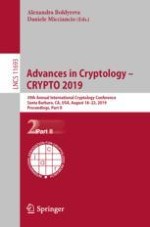2019 | OriginalPaper | Buchkapitel
Unconditionally Secure Computation Against Low-Complexity Leakage
verfasst von : Andrej Bogdanov, Yuval Ishai, Akshayaram Srinivasan
Erschienen in: Advances in Cryptology – CRYPTO 2019
Aktivieren Sie unsere intelligente Suche, um passende Fachinhalte oder Patente zu finden.
Wählen Sie Textabschnitte aus um mit Künstlicher Intelligenz passenden Patente zu finden. powered by
Markieren Sie Textabschnitte, um KI-gestützt weitere passende Inhalte zu finden. powered by
